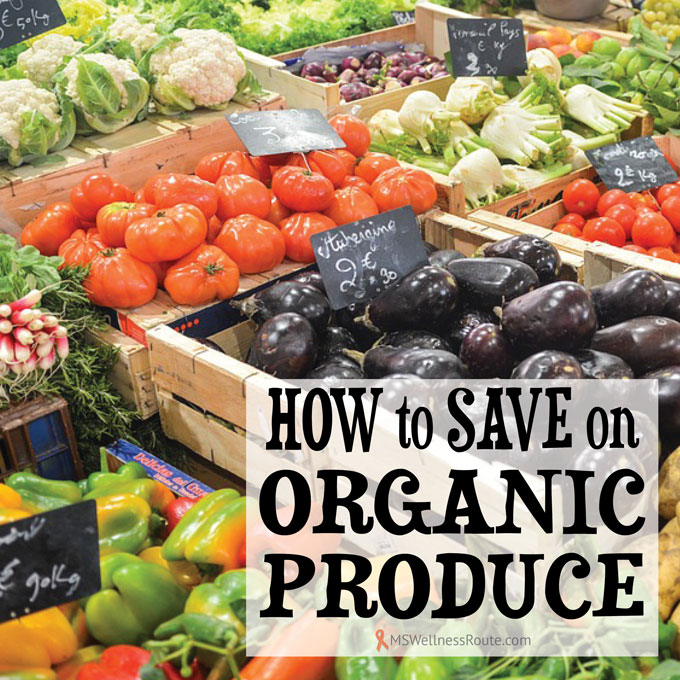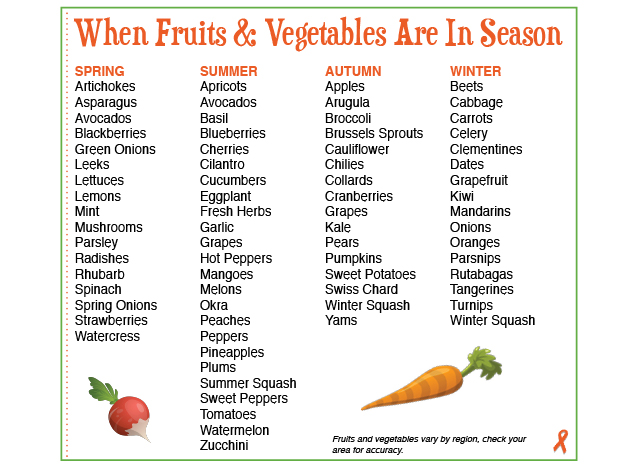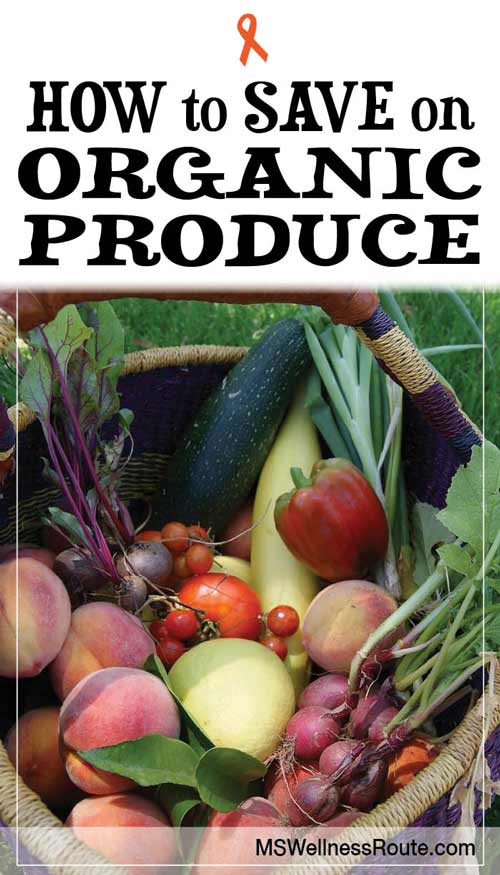Last Updated on December 11, 2023 by Cathy

We all love the idea of eating organic produce to stay healthy and avoid pesticides. The problem with trying to eat organic produce also means spending more money.
With the cost of groceries going up every day, it becomes harder and harder to spend even more money on organic. I have heard many, many times “I can’t eat organic produce, it’s too expensive!” Granted organic produce is more expensive than conventional produce, but there are ways to save.
What does organic produce mean?
- Eating organic produce means eating without the use of pesticides, herbicides, synthetic fertilizers, or genetically modified organisms (GMOs).
- Organic food is more nutritious and has higher antioxidants. Organic is better for you and your family’s health and for the environment.
- Eating organic supports optimum health benefits, especially for children and those with health conditions like autoimmune diseases.
- In studies, pesticides have been associated with disruptors in the normal functioning of the central nervous system, and endocrine system and increased risk of cancer.
- You can wash non-organic produce, but it doesn’t effectively reduce all pesticide residues.
“You can wash non-organic produce,
but it doesn’t effectively reduce all pesticide residues.”
To heal your body and possibly put your autoimmune disease into remission, it’s important to remove as many toxins as possible. Eating organic produce is a good way to start your healing process.
Jane Goodall who studied primates (apes, monkeys, and chimpanzees) discovered when giving an ape an organic banana they would eat the entire banana, including the skin. But when she would give them a non-organic banana they would peel the banana first. She tested this many times, and they would repeat this same action each time.
Why does organic cost more?
Organic farms are generally smaller than conventional farms, it takes more time and labor to produce organic crops because they avoid using toxic chemicals. So, if the organic farmer is avoiding the extra costs of chemicals, then why is it more expensive?
It’s not that organic produce is more expensive, it’s because traditional farmers are subsidized by the government using our taxpayer’s money. Therefore, the price of organic produce reflects the real cost of growing crops.
Fortunately, as the demand for organic produce continues to grow, the cost will also continue to drop. Have you noticed that some organic produce is cheaper than non-organic?
How to Save Money
To help save money when your budget is tight, you don’t have to eat all organic produce. The Environmental Working Group (EWG) came out with a Dirty Dozen, Clean Fifteen list showing which produce has the most pesticide residues.
To avoid the most chemicals, it is important to buy organic if the produce is on the Dirty Dozen list. Apples are so heavily sprayed with pesticides, that the pesticides can even be found in apple juice and applesauce.
Try to buy organic:
Apples
Peaches
Nectarines
Strawberries
Grapes
Celery
Spinach
Sweet Bell Peppers
Cucumbers
Cherry Tomatoes
Snap Peas
Potatoes*
Also including:
Hot Peppers and Kale
Fruits and vegetables lower in pesticides:
Avocados
Sweet Corn**
Pineapples
Cabbage
Sweet Peas, frozen
Onions
Asparagus
Mangos
Papayas
Kiwi
Eggplant
Grapefruit
Cantaloupe
Cauliflower
Sweet Potatoes
*Avoid eating potatoes due to their quick spikes and drops in blood sugar, sweet potatoes are OK. **Avoid eating corn, it’s a grain.
Did you know? You can eat the tops of organic strawberries. Include the entire strawberry (including the greens) into your salad or smoothie.
Grow Your Own Garden
Another way to save money is to grow your own organic vegetable garden. As my walking got worse, my garden got smaller. That didn’t stop me from growing vegetables and herbs in containers. Container gardening is also great if you don’t have room for a large garden.
Grow your own herbs, organic herbs are extremely expensive and they are so easy to grow in pots. When the weather starts getting cold bring them indoors, now you’ll have fresh herbs all winter.
I like to buy Miracle Grow Organic Garden Soil at Home Depot during their “Spring Black Friday” sale each April.

Farmers Markets
Another way of saving money is straight from the farmer and avoiding the middleman. I find lots of organic produce at my farmer’s market. Prices vary by region, but it’s a great way to get out to meet your farmer and enjoy the day.
I live in a small town but during the summer every Saturday we have a farmers market from 8 am-Noon. I like to go closer to closing when the crowd is smaller, it’s not yet hot outside (for heat intolerance), and the farmer has more time to talk. Sometimes, I can even get a good deal on something because they just want to clear everything out.
Sometimes, I can even get a good deal on something because they just want to clear everything out. Once I bought apple butter, and she gave me the recipe to make it myself!
Pick Your Own
Some farmers have you pick your own fruits or vegetables, this includes organic farms. My area has many pick-your-own farms and orchards to choose from, including cherries to rhubarb.
Bring a picnic and make a day of it with your family and/or friends. Call ahead to see it they have a picnic area if they are wheelchair accessible and if they have porta-potties.
Community Supported Agriculture (CSA)
Sometimes known as community-shared agriculture, this is a locally-based food distribution. With a CSA, you pay a fixed price upfront for a share of a farmer’s organic crop. You can’t always choose the particular fruits and vegetables you want but you end up spending less per pound per item.
I have not tried this myself, but I have heard from others that this is a great way to get a huge variety of different local produce.
Stores
You normally don’t see coupons for fresh produce unless you sign up for their loyalty cards. Granted with loyalty cards the store is now tracking what you buy, but they give you coupons and rewards for what you are already buying including organic.
When produce does go on-sell it’s because it’s in season, this is when produce is at its peak of ripeness and supply. It costs less because it costs less for farmers and distributors to get it to your grocery store. Stock up on organic frozen produce whenever it goes on sale, this is a great way of saving. The produce is picked at its peak of ripeness and it has just as many nutrients as fresh.
Shop around to find which stores have the best prices, I shop at 3 different stores knowing which store has the best price (not shopping on the same day). Check your store’s weekly ads, and plan your meals around what is on sale that week.
Don’t forget about membership stores like Costco. I find awesome deals on fresh and frozen organic produce, I love their frozen wild blueberries. Although my Costco doesn’t have as many fresh organic vegetables they are working to increase this.
Did you know? You can go to Costco and shop by just using a gift card, no need to buy a yearly membership!
Buy In Season
One of the easiest ways to save on organic produce is to buy it when it’s in season. The “fresh” produce in stores is often picked before they’re ripe and then loaded onto trucks or boxcars to be shipped across the country. As a result, both flavor and nutrition are inferior to in-season locally grown.
Organic produce generally goes on sale at your local grocery stores when they are in season. This is when you’ll be able to find the lowest prices and the best tasting. Buying organic produce when it’s in season may seem like common sense, but it’s one of those things most of us ignore. Plan your meals around the seasons. Asparagus in the spring, tomatoes, and zucchini in the summer, winter squash in the fall and winter.
We live in a world where you can purchase produce at any time of the year. Learn the growing seasons of the fruit and vegetables in your area, and buy them during that season. You will be tasting them at their freshest and most flavorful peak, and you’ll be saving a lot of money.
Regions vary so pay attention to what is in season for your state. I live in Idaho so I won’t ever see citrus or avocados growing here. But that doesn’t stop the prices from going on sale when they are in season in California.

As you’re working on healing your body, vegetables should be your main meal. Eat a huge variety, including ones you’ve never tried like rutabagas. You need to include vegetables with every meal including breakfast. Eat organic dark leafy greens, sulfur veggies, and colorful veggies every day to get the most nutrient-dense variety your body needs to heal.
Don’t be afraid to try vegetables you hated as a child. I think most of us ate boiled, bland-tasting vegetables. – No wonder we hated them! Try roasting them, grilling them, or cooking them in coconut oil in the skillet, use different seasonings to enhance their flavors. Grilling fruits (like pineapple) on the grill they become sweeter and are delicious! Don’t eat too much fruit at once, as you’re healing your body even natural fruit can cause problems. It’s best to consume berries, they have the highest antioxidants.
Choosing seasonal and locally grown organic produce can help offset the cost of non-organic produce. Start a garden or container garden, ask a neighbor (with a vegetable garden) if they could grow a little extra for you, and compensate them for their efforts. Get outside, move, and enjoy the sunshine by going to a farmers market or pick-your-own. Eat organic as much as possible and get your body to start healing.
Healing is the most important thing you can do for yourself!
How do you save when buying organic produce?
You may also enjoy reading: What to Look for When Buying Paleo Food
Click the image below to pin:






